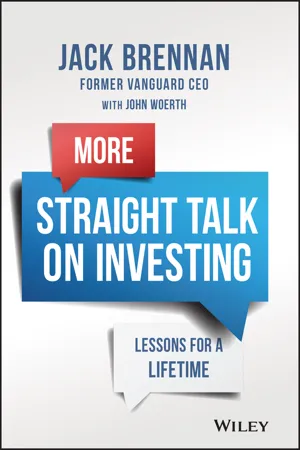
- English
- ePUB (mobile friendly)
- Available on iOS & Android
About this book
A practical and pithy guide to investing to help everyday investors achieve their long-term goals
The 21st century has been beset with three financial market shocks in its first 20 years, the bursting of the Tech Bubble in 2000-2002; the Global Financial Crisis of 2008-09; and 2020 COVID-19 crash. Given this backdrop, it is no wonder that investing can appear to be so daunting to individual investors.
As Chairman and CEO of Vanguard, one of the largest and most respected investment management companies in the world, Jack Brennan has spent his career helping people invest their money. In the newly updated More Straight Talk on Investing, he shares with you the lessons he has learned over his over four decades at Vanguard from a variety of market participants—from Main Street investors and 401(k) plan holders to veteran portfolio managers at the helm of Vanguard funds and sophisticated investment professionals overseeing top endowments and foundations.
This a comprehensive, but approachable book will help you develop the knowledge, confidence, and discipline to navigate the financial markets and attain investment success over the long term. While the financial planning and investing principles covered are timeless, a considerable amount has changed in the nearly 20 years since the first edition, including new products and services, lower costs, and ever-evolving regulation and legislation. An entire generation of investors has come of age over the past two decades and could benefit from understanding that sound and sensible investing is an effective way to achieve financial security.
This book will assist your manage your "serious" money—the dollars that you set aside for long-term goals, such as retirement or the education of your children. The book also emphasizes the concept of thinking of yourself as a "financial entrepreneur"—managing your financial life like owner manages a business.
In a straightforward, plain talk manner, the book demonstrates how to:
- Build a balanced, diversified portfolio that meets your needs and goals
- Evaluate mutual funds and ETFs with a discerning eye
- Adhere to a long-term, disciplined approach to investing
- Control your emotions and tune out the incessant "noise" in the media
- Understand the risks and rewards of financial markets
- Develop a prudent plan and investment policy statement to guide your path forward
- Avoid the pitfalls and mistakes that can derail your investment program
With wit and wisdom, Brennan relays anecdotes and observations that demonstrate the enduring investment precepts that will serve as a guide to novice investors and as a practical refresher for seasoned investors. He has also added three new chapters focusing on evaluating advice options, garnering lessons from endowments, and dealing with the challenges of a low interest rate environment.
Frequently asked questions
- Essential is ideal for learners and professionals who enjoy exploring a wide range of subjects. Access the Essential Library with 800,000+ trusted titles and best-sellers across business, personal growth, and the humanities. Includes unlimited reading time and Standard Read Aloud voice.
- Complete: Perfect for advanced learners and researchers needing full, unrestricted access. Unlock 1.4M+ books across hundreds of subjects, including academic and specialized titles. The Complete Plan also includes advanced features like Premium Read Aloud and Research Assistant.
Please note we cannot support devices running on iOS 13 and Android 7 or earlier. Learn more about using the app.
Information
PART I
MASTER THE BASICS
1
Successful Investing Is Easier Than You Think
A Great Time to Be an Investor
- Be knowledgeable: Do your homework.
- Be disciplined: Develop good habits.
- Be skeptical: Avoid fads.
- Be observant: Keep learning about investing.
Be Knowledgeable: Do Your Homework
Baseline Basics: Understanding the Asset Classes
Asset classes
Stocks
Table of contents
- Cover
- Table of Contents
- Title Page
- Copyright
- Dedication
- Preface
- Author's Note
- Acknowledgments
- PART I: MASTER THE BASICS
- PART II: CONSTRUCT A SENSIBLE PORTFOLIO
- PART III: MANAGE YOUR INVESTMENTS WITH FOCUS AND DISCIPLINE
- PART IV: STAY ON COURSE
- Afterword
- Postscript
- Appendix: Investment Terms
- Index
- End User License Agreement